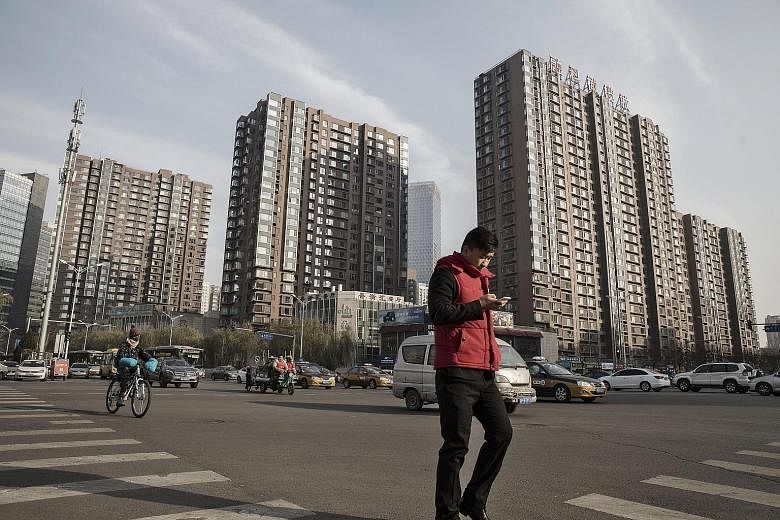BEIJING • China's economy cooled further last month, with industrial output, fixed asset investment and retail sales missing expectations as the government extended a crackdown on debt risks and factory pollution.
Beijing is already in the second year of a campaign to reduce high levels of debt as the authorities worry that riskier lending practices, especially in the real estate sector, could imperil the economy.
Data yesterday suggested policymakers are making progress in defusing financial risks by weaning China off its years-long addiction to cheap credit, and signalled moderating growth over the next few quarters.
Industrial output rose 6.2 per cent year on year last month, the National Bureau of Statistics said, lagging behind a 6.6 per cent increase in September.
Fixed-asset investment growth also slowed to 7.3 per cent in the January-October period, from 7.5 per cent in the first nine months.
"The moderation in activity data released today suggests that growth slowed in October and adds to our conviction that it will continue to do so in the quarters ahead," Nomura analysts wrote in a note to clients.
In the property sector, where the authorities have tightened rules to flush out speculative financing that has helped drive a two-year boom, sales and new construction starts fell last month.
Property investment growth also cooled to 5.6 per cent last month year on year, from 9.2 per cent in September, Reuters calculated from National Bureau of Statistics data out yesterday.
"I think this (slowdown in real estate) is exactly what the government is looking to do. I don't see them changing their policy course," said Mr Jonas Short, who heads the Beijing office at investment bank Sun Hung Kai Financial.
China's economy has surprised financial markets with robust growth of nearly 6.9 per cent in the first nine months of this year, underpinned by a recovery in its manufacturing and industrial sectors, thanks to a government-led infrastructure spending spree, a resilient property market and unexpected strength in exports.
That has supported the world economy as the Asian giant has continued to hoover up commodities and consumer goods, helping to stoke underlying global demand for cars, smartphones, TVs and industrial products.
And the overall picture backs the consensus view that the economy is entering a period of moderation rather than a rapid deceleration. China's producer prices, for instance, were surprisingly strong last month.
Since the third quarter, the world's second-largest economy has started to show signs of fatigue, with momentum seen slackening further as Beijing's crackdown on debt risks curbs demand and tighter pollution rules hits factory output. China's exports and import growth both eased last month, while the smog war dragged on manufacturing activity and pulled average daily crude steel output down for a second straight month in October.
The latest data also showed consumers might be tightening their purse strings.
Retail sales gained 10 per cent last month year on year, below the 10.3 per cent growth in September.
Private sector fixed-asset investment slowed to 5.8 per cent for January-October, compared to 10.9 per cent growth in investment by state firms.
Private investment rose 6 per cent for the nine months ended in September.
REUTERS

